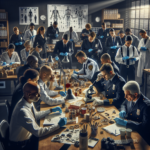After their 1994 murder conviction was overturned, Sean Tyler and Reginald Henderson, brothers from Chicago, were given certificates of innocence.
- tcweekly
- brothers, certificates, Chicago, conviction, Henderson, innocence, murder, overturned, Reginald, Sean, Tyler
- 0 Comments
Get at least 6 FREE Stock Shares today
As a former investigative journalist, forensic analyst, and retired detective, I, Gregory Norton, have dedicated a significant part of my life to understanding crime, the criminal mind, and the intricacies of law enforcement procedures. Today, I dive into the case of Sean Tyler and Reginald Henderson, who were recently granted their certificates of innocence for a 1994 murder case in Chicago. It is a complex and disturbing tale of a malfunctioning justice system, wrongful accusations, tortured confessions, and the relentless struggle for redemption.
In 1994, Tyler and Henderson were unjustly pointed out as key suspects in a murder case by none other than Jon Burge, then a lauded commander in the Chicago Police Department. However, the truth twisted in an utterly sinister direction as these two were improperly coerced into making false confessions to law enforcement officers.
It is important, at this juncture, to provide contextual information about Burge, who has been widely disgraced and discredited. The former CPD commander wasn’t just a bad apple; he was the very embodiment of a rotten barrel. He, along with his colleagues, were implicated in a series of police abuse cases, nearly 200 in total, primarily with African American men.
Years of incarceration bit into Tyler and Henderson’s lives, carving out wells of despair, until their eventual exoneration. The fight was hard-won, but it did not end with the exoneration. The battle shifted to obtaining certificates of innocence from the county state’s attorney in a bid to fully absolve them. This would effectively expunge their murder convictions, lift the weighty felon labels that had shackled them for years, and restore their rightful place in society.
The Chicago Alliance Against Racist and Political Repression relentlessly fought for Tyler and Henderson’s rights, aiming to bring them justice. Their efforts saw both men finally receive their certificates of innocence from Judge Erica Reddick.
However, the retrial is a double-edged sword, both bitter and sweet. While the granting of innocence certificates marks the end of their struggle and offers a fresh start, it also highlights time irretrievably lost. The poignant note struck home when considering their mother, who sadly passed on before the day of their exoneration. It underscores the hardship of their ordeal – the emotional, psychological, and familial toll that wrongful convictions extract over time.
Following their release, Tyler and Henderson declared their intent to leverage their experiential knowledge as voices advocating for those similarly wrongly accused. Their fight for justice extends beyond their personal battles and into broader systemic issues that unfortunately persist in law enforcement.
The collective narrative of Tyler and Henderson serves as a distressing reminder of the fallibility of our legal system. But more so, it is a testament to the human spirit’s resilience – standing up to long-drawn battles against institutional pitfalls.
In many ways, their cases parallel another wrongfully convicted individual, Roosevelt Myles, who continues to seek justice. Such instances reiterate the crucial need for transparency, fair play, and enduring stress on the “innocent until proven guilty” tenet in our justice system.
Their exoneration could potentially lead to state compensation for their wrongful convictions. While money can’t replace lost time, it may lend a helping hand toward rebuilding their lives.
As I conclude this overview – without actually using the word “con”, I reflect on their story as a true crime expert with a mixture of empathy and outrage. It underscores the pressing requirement for revamping interrogation guidelines, ensuring the psychological well-being of the suspect, and investing more in forensic science and other factual evidence during investigations.
The fight is far from over, particularly for those unjustly incarcerated. Tyler and Henderson’s journey illuminates hope amid a struggle. It’s a rallying cry for justice, a beacon for the wrongfully convicted, and a sobering reminder of the work that still needs to be done.
Get at least 6 FREE Stock Shares today



